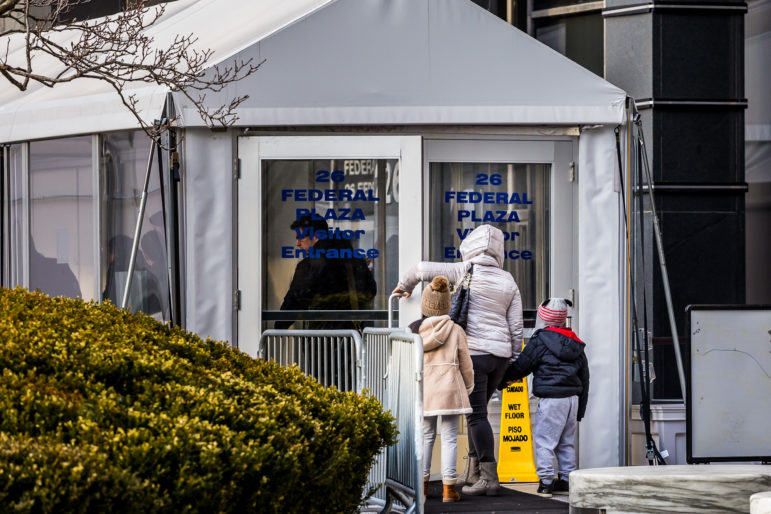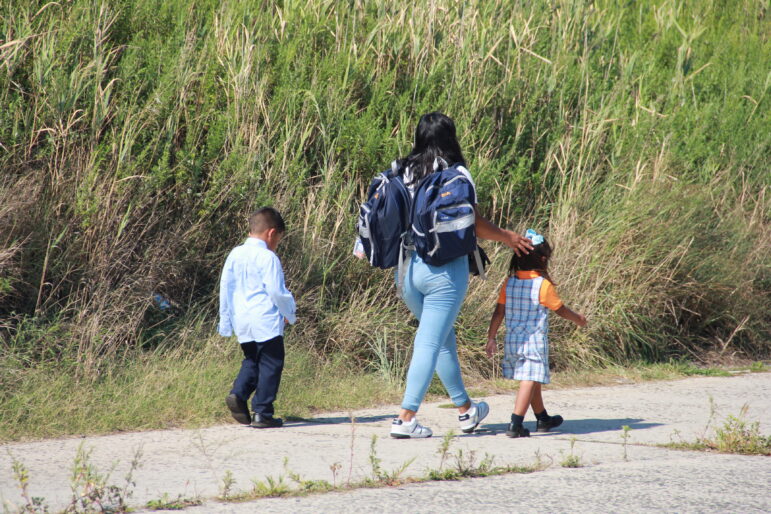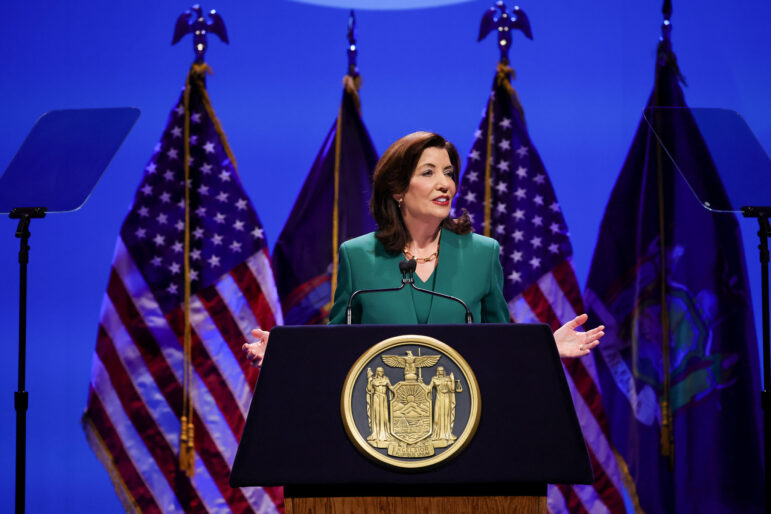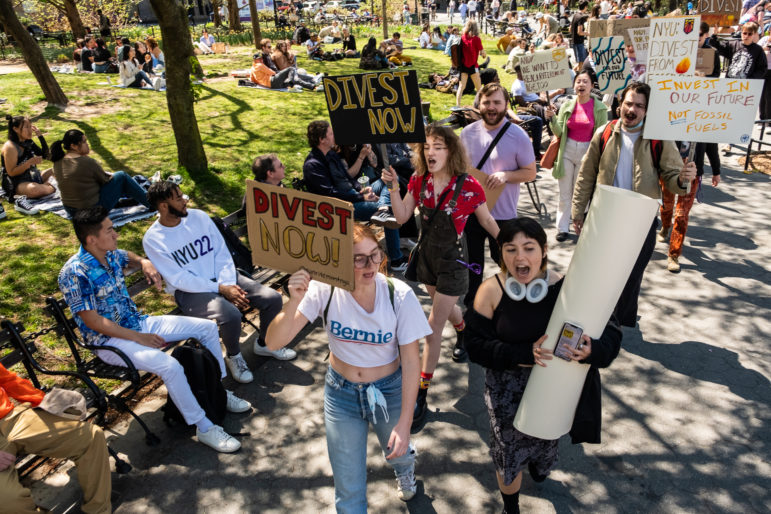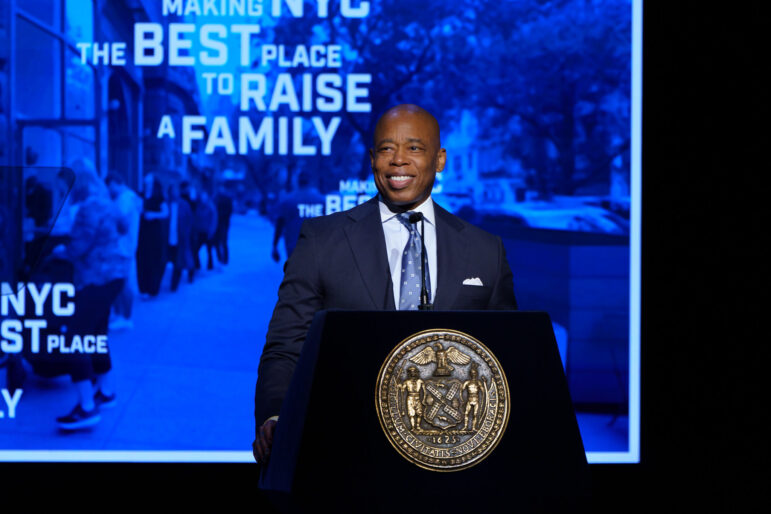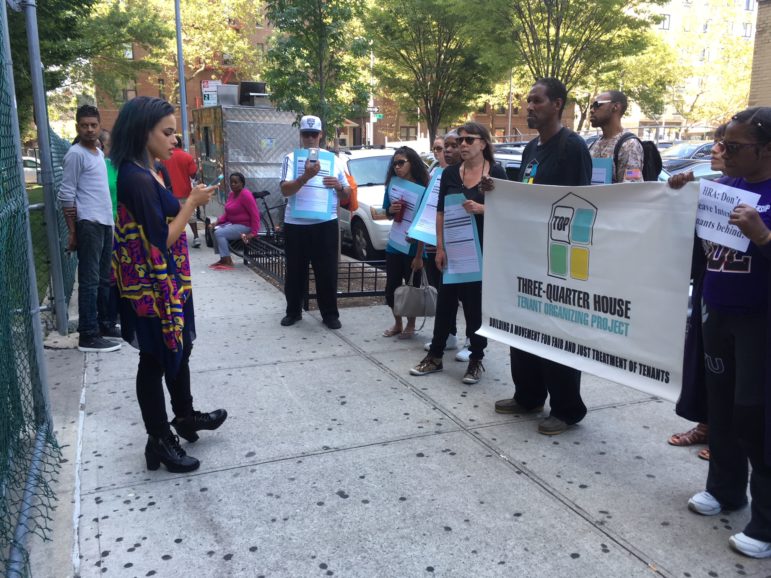
VOCAL-NY
The author (speaking) and other Interline tenants rallied outside a city public-assistance office in Jamaica, Queens to demand the vouchers for people trying to escape three-quarter houses.
Every day is Groundhog Day for three-quarter house tenants. First, you are fooled into living in a three-quarter house, masquerading as a housing program linked to drug-treatment services. You are promised help to find permanent housing, employment, and educational opportunities. You are packed into a small room with other tenants and are required to go to a drug treatment program of the landlord’s choice in order to keep a roof over your head.
Then, after enduring months of harassment and threats of getting kicked out by house managers, you get surprising news: Your landlord has just been indicted on charges of Medicaid fraud. They close the drug program and abandon your building, and conditions in the house worsen. You call the New York State Office of Alcohol and Substance Abuse Services (OASAS)—the agency responsible for licensing and overseeing the drug-treatment program you’ve been attending for months—but no one answers your calls for help. Despite your best efforts to escape the deteriorating house, you are left in a state of perpetual housing instability, every day shuffling from one government agency to another seeking help.
This is what is happening to me and dozens more who live at seven three-quarter houses in Brooklyn and Queens, formerly run by a company called Interline. When Interline abandoned the buildings, some tenants were left without functioning locks on front doors, while others experienced week-long interruptions to heat, hot water, and electricity and broken sewer pipes. And to make matters even worse, we are now all at risk of eviction. Many tenants are already in court fighting to keep a roof over their heads.
I was angry that Interline took advantage of us. I was happy to see that the New York State attorney general intended to hold Interline accountable. But despite all the rhetoric about helping those struggling with homelessness and substance use, the tenants left behind after the indictment have seen little action from state agencies.
This is not a new phenomenon. In the past three years, other similar Medicaid fraud schemes have been taken down by authorities. Hundreds of tenants experienced exactly what we are experiencing right now: homelessness, relapse, risk of death. At least four state-licensed programs have closed following indictments related to Medicaid fraud. Government agencies should know what to expect by now. But after seeing that chaos and crisis occur time and time again, how is it that the city and state have no plan to help people who are victims of these schemes?
When we realized that no one was coming to our aid, we started requesting help. We asked the city and state to put their differences aside and work together to ensure our security in the former Interline houses, and help us secure safe permanent housing elsewhere.
Eventually, the city stepped in to ensure we have functioning locks, heat and hot water, and they provided us with a rental assistance voucher to help us pay for housing. But not everyone needs the same kind of housing. That’s why we have been asking for housing specialists who can assess peoples’ housing needs and can work with each of us to find the appropriate kind of housing.
OASAS, on the other hand, has done little to help, even though they were the agency supposedly overseeing Interline. Instead of offering meaningful support, they created a referral sheet, which does not include any OASAS housing resources. In their written response to our requests, they said, “OASAS does not oversee or direct permanent supportive housing or affordable housing opportunities in New York City.” However, a basic internet search on OASAS’s website states exactly the opposite: “OASAS oversees the following brands of [permanent supportive housing] programs,” and lists the programs.
Does the state agency in charge of overseeing drug-treatment and recovery services in New York need to be reminded that we are in the midst of a homelessness and opioid crisis? By not dedicating resources to help us obtain safe, decent housing, people will inevitably slip through the cracks. They already have.
What’s at stake by not having a plan to help us? My life is at stake. Without knowing what the next day will bring—whether my house will have hot water or if I’ll receive a notice of eviction—I am not able to take the steps to continue working on achieving my goals, like pursuing my education or finding stable employment. Instead, the stress of perpetual housing instability puts my recovery at risk.
I refuse to stay silent. My life is just as important as anyone else’s. Address this housing crisis. Create a plan for similar situations in the future. It’s unacceptable and irresponsible to allow three-quarter house tenants to wake up to this same injustice again and again.
Jasmine Monk is a member of the Three-Quarter House Tenant Organizing Project (TOP), a tenant’s union supported by Mobilization for Justice, Neighbors Together, and VOCAL-NY.
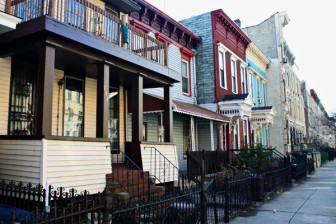 Three-Quarter HomesMarch 2012
Three-quarters houses give people who are homeless, leaving prison or seeking substance-abuse treatment a place to stay, and government agencies indirectly fund them. But critics say the houses are unregulated, often overcrowded and sometimes abusive to the vulnerable people they serve.
Three-Quarter HomesMarch 2012
Three-quarters houses give people who are homeless, leaving prison or seeking substance-abuse treatment a place to stay, and government agencies indirectly fund them. But critics say the houses are unregulated, often overcrowded and sometimes abusive to the vulnerable people they serve.


